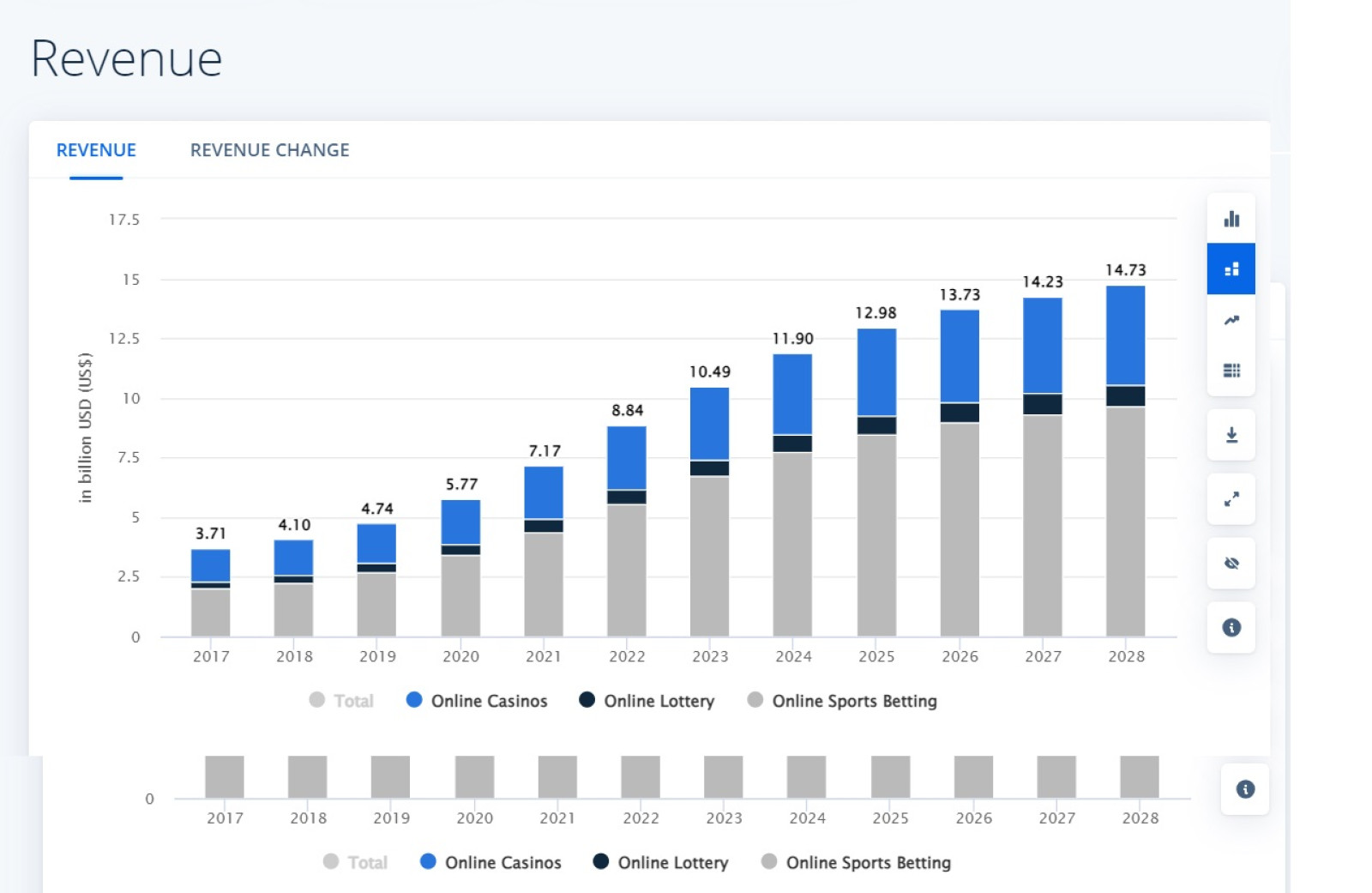-content.jpg@avif)
As the entertainment landscape has revolutionised traditional gaming methods in Asia, operators seek new opportunities to profit from this scene.
In recent years, online casinos, sports betting, and virtual poker rooms, just to name a few iGaming activities through digital platforms, have experienced an expansion on a global scale.
Many ask how this expansion is happening and how it can benefit businesses and operators. To answer this question, we invite you to read this article, which explores the recent growth and particularities of Asian countries, including Japan, The Philippines, South Korea, Indonesia, Vietnam, and India.
Learn about the cultural shift in online gaming, how the Philippines is emerging as a promising hub, and much more.

Source: Statista
Marked by a significant transformation, the iGaming industry has emerged from a niche market to an important player in Asia and globally. The first key factor driving its growth, as has happened in other countries, is internet proliferation.
Besides that, the recent changes in the landscape in Asia have created new opportunities for operators to expand their global reach. The shift observed is the advanced cutting-edge technology, which has brought user-friendly interfaces, immersive graphics, and the ability to quickly and easily start an online casino or other iGaming business.
However, this is all. The concepts of iGaming and eSports have come together, and we are witnessing these two industries collaborating on this industry for expansion.
More security on payment methods, with seamless transactions, has boosted many players' confidence. As the possibilities for easy deposits and withdrawals evolve, they contribute to the iGaming expansion in Asia.
One more factor is that now, iGaming operators can craft and create more effective marketing campaigns, for instance, by using an affiliate marketing channel as a resource to expand their audiences and attract new players.
According to Statista, the Asian online gaming market is expected to reach US$11.90 billion by 2024. Japan, South Korea, Indonesia, Vietnam, India, and especially the Philippines are emerging as significant markets in this sector.
Research suggests that, among the population's preferences, sports betting covers the lion's share of the total online gambling market in the Asia-Pacific region.
The main regions where we can see the growth of the iGaming market are China, India, Japan, South Korea, Indonesia and others. This growth has been driven, above all, by using mobile devices. Below, we'll take a closer look at the most popular iGaming activities:

Source: Market Research Future
The following section will explore how each country approaches iGaming and the challenges and opportunities for businesses and operators seeking to uncover Asia's full potential.
In 2024, the projected revenue in the Online Gambling market in Japan is expected to reach ¥US$6.19bn, and the user penetration will be at 7.9% in 2024. Due to its population of 126 million, Japan indeed represents a lucrative market for iGaming operators.
The growing acceptance of digital payments, alongside the popularity of smartphones, are some of the aspects that are helping to expand this industry in Asia. In recent years, the popularity of online casinos, sports betting, and online gaming experiences, especially virtual reality, has grown significantly.
In addition, there has been a fusion of social aspects in online gambling platforms. Increasingly, Japanese consumers are preferring and seeking social interactions and connectivity in online gambling.
To meet this growing demand, online gambling operators have started integrating features such as live chat, multiplayer games, and social media connectivity into their platforms, enriching experiences between players and a mix of social media and iGaming experiences. In this way, by 2028, the number of users is expected to reach 11.3 million, according to research by Statista.
Alongside the other Asian countries, South Korea has also developed into a promising digital scene, which still needs improvement.
With a population of 52 million, mobile gaming and eSports tournaments are growing in popularity, opening up new opportunities for iGaming operators.
In South Korea, gaming is highly regulated, and only one casino is open to locals in Kangwon Land. On the other hand, online platforms are attracting increasing interest. However, bear in mind that South Korean residents cannot access domestic online gambling options.
Nevertheless, the online gambling market in South Korea is expected to reach revenues of US$878.70 million by 2024, based on Statista's projection.
Online gambling has also gained ground in Indonesia, reflecting the population's growing interest in digital entertainment. Indonesia's population is estimated to be over 270 million, representing an exciting audience for iGaming operators.
Many of this population are interested in sports betting platforms and casino games, and their demand has significantly increased. However, operators need to keep in mind that the iGaming activities in the region are still challenging due to regulations.
Vietnam has a population of 97 million people. Of course, not all are as interested in online gaming as in other regions, but this still shows a high potential for operators.
Apart from the rise of the Internet, we can point to the increase in the country's middle class, which is constantly looking for online entertainment. However, there are also restrictions. But despite this, the demand for casino games and sports betting has increased, with many Vietnamese players accessing offshore gambling websites.
India has witnessed significant growth, driven by over 1.4 billion people, many of whom increasingly embrace digital technology and entertainment.
The popularity of online gambling platforms offering casino games, sports betting (mainly cricket, soccer and kabaddi) and fantasy sports has soared, with a growing number of players accessing these platforms via smartphones and computers.
However, regulatory uncertainties and social concerns related to problem gambling pose challenges for the industry, requiring operators to overcome legal complexities and adopt responsible gaming practices to ensure sustainable growth.

With 114 million inhabitants, the Philippines has developed a regional concept for regulating iGaming operations. The Philippine Amusement and Gaming Corporation (PAGCOR) regulates and licences online gambling activities.
This provides operators with a stable, secure, reliable framework to boost their business. An English-speaking population and an established infrastructure make the Philippines an ideal destination for companies looking to enter the Asian iGaming market.
The main trends are live dealer games and eSports betting. Another significant impact is the rise of online gambling, given the availability of gambling apps for mobile devices, which allow players to enjoy their favourite games on the go. Through online gambling platforms, players can participate in various games and bet from the comfort of their homes without visiting land-based casinos.
Statista's projections indicate that by 2024, the projected revenue for the online gambling market in the Philippines is expected to reach US$ 680.00 million. In addition, the number of users in the online gambling market is expected to reach 4.9 million by 2028.
Thanks to PAGCOR (Philippine Amusement and Gaming Corporation), a government-owned agency that regulates and licences online casinos, sports betting platforms, and other iGaming operators, the Philippines is now attracting numerous international iGaming companies.
Moreover, the Philippines offers special economic zones, such as the CEZA (Cagayan Economic Zone Authority), the Aurora Pacific Economic Zone, and the Freeport Authority, which allow operators to enjoy tax incentives and streamlined regulations.
Despite the legislation in other Asia regions still under expansion, the Philippines has shown an example of how to foster collaboration, transparency, and adaptability. This helps operators better navigate complexities and maximise the potential in Asia’s dynamic market.
Many new players are attracted to online gaming because of its competitive aspect. However, this is evolving increasingly, as with esports competitions, which seek to bring significant conventional sporting events to life.
In addition to the social and competitive aspects, Internet gaming is driving the advancement of technology. To create immersive, cutting-edge gaming experiences, game developers are pushing the boundaries of virtual reality and visuals.
The need for high-performance hardware has triggered inventions that influence development in various sectors and extend to more general technical domains.
Thus, the future of interactive digital experiences is being shaped by the growing influence of the online gaming industry on global entertainment and social dynamics. Likewise, the industry is adding more and more gamification to its offerings, making online gaming increasingly attractive and allowing it to reach a wider audience than physical casinos and traditional betting stores.
The possibility for players to enjoy the games and the similarity to video games from the comfort of their homes or any remote location means that the culture rapidly shifts to the online space.
The continent of Asia hosts a plurality of countries and cultures. Some regions are among the most densely populated in the world, while others are on the opposite spectrum. It is also popular in very technologically advanced nations. Thus, it is essential that data, AI, and security are the core drives in overcoming the challenges associated with this part of the world, as we will explore below.
- Harnessing data analytics and AI for targeted marketing
Data constructs are helpful because of their scalability. The greater the data feed applied, the greater the accuracy. As this continent is home to some 4.78 billion people, according to UN estimates in early 2024, it generates a large amount of analytical data when used appropriately.
Since AI systems were invented, user consent has been the primary issue with data collection. Surprisingly, 62% of sample customers have been receptive to companies using their data for AI analysis. IGaming companies, in turn, also have access to user behaviour models simply by studying their own industry-specific audience. Combining these two data streams presents excellent business opportunities for the region as long as they comply with local legalities.
- Enhanced user experience through VR and AR technologies
Virtual Reality, also called Augmented Reality (AR/VR), is an amazing piece of technology. It enables those connected to it to experience a redefinition of the rules of reality, opening up possibilities only limited by the imagination.
However, the challenge is that data processing still needs to be on par with the speed of human perception. This technology is only being developed, and the hurdles are economic and geopolitical.
Several countries, like China, South Korea, and Japan, can overcome this challenge. They recognise the potential and are investing heavily in this technology, which is already available to the masses, albeit with limited capabilities.
Again, the data feed plays a big part in how it operates. VR is a manifestation of data with programmable rules. Therefore, it can be applied in all branches of the iGaming industry, especially as it becomes increasingly cheaper.
- Blockchain: ensuring transparency and security
In today's digital landscape, ensuring data security and transparency is imperative across virtually all sectors. Blockchain technology is the pivotal solution, offering decentralised, distributed ledger systems that uphold secure and transparent record-keeping.
By eliminating intermediaries and enabling users to maintain tamper-proof transaction records, blockchain fosters trust and equality among parties, mitigating data corruption risks.
Blockchain's role extends beyond financial transactions to revolutionising supply chain management, where transparency is paramount. Supply chain processes gain unprecedented traceability through blockchain, enabling real-time visibility into product provenance and movement.
The technology's inherent security features, such as immutability and cryptographic encryption, fortify supply chains against fraud, counterfeiting, and data breaches.
While blockchain presents remarkable opportunities, integrating it into existing systems requires addressing scalability, standardisation, and data privacy challenges - all issues not unfamiliar to high-end operators in the gambling industry.
In cybersecurity, blockchain introduces a trustless environment where transparency and accountability flourish. Security vendors can leverage blockchain to validate threat data, ensuring accuracy and legitimacy without relying solely on vendor claims. This transparency not only empowers users to make informed decisions but also bolsters compliance efforts, particularly in regions with tight cybersecurity regulations.

Due to the promising scene, Asia has proven to be an ideal region for new iGaming businesses. Part of its potential lies in the new opportunities, thanks to its population engaged with electronic devices, technological advances, and online entertainment alternatives.
In this way, Asia is already considered a leading force in digital entertainment, reinforced by Japan, The Philippines, South Korea, Indonesia, Vietnam, and India. However, despite many opportunities to be exposed, Asia needs to navigate its regulatory complexities. For this reason, the region has yet to reach its full potential.
In Japan, we can observe a fusion of social aspects in online gambling platforms as consumers seek more social interactions and connectivity. This can represent a growing demand for operators to apply social media aspects to iGaming experiences, including integrating features like live chat, multiplayer games, etc.
Moreover, the Philippines has developed a regional concept for regulating and licensing online gambling activities, the Philippine Amusement and Gaming Corporation (PAGCOR). It provides operators with a stable, secure, and reliable navigation framework. One of the biggest challenges facing the iGaming industry is undoubtedly changing public perceptions. To do this, educating the public about responsible gaming practices, security measures, and the industry's positive aspects is essential.
In addition, to encourage further exploration and investment in this dynamic market, the industry needs to openly share information about odds, fair play, and responsible gaming practices to build trust and work with regulators, policymakers, and advocacy groups to create a positive narrative around iGaming.
To move the industry forward, it is also essential to highlight the economic contributions, and technological advances associated with the industry.
Online Gambling - Asia | Statista Market Forecast
Online Gambling - Philippines | Statista Market Forecast
Online Gambling - South Korea | Statista Market Forecast
Online Gambling - India | Statista Market Forecast
Online gambling in Asia Pacific- Facts - News
Latest iGaming trends in Asia - 1ST BLOG
Unveiling The Asian Online Casino Market: Key Players And Emerging Trends - WebSta.ME
Unlocking The Potential Of AI And Data Analytics For Digital Advertising
AI Your Marketing Analytics: 5 Innovative Ways to Leverage AI for Deeper Data Insights
How to leverage AI in marketing: three ways to improve consumer experience
Online Casino Industry in Southeast Asia: Philippines, Malaysia, and Thailand
iGaming Report 2023: Trends, Market Share & Size, Frauds & Key Players
The Unstoppable Rise of Online Gaming: A Cultural Shift in the Digital - Jsyuanai
The Phenomenon of Online Gaming: A Cultural Shift in Digital Entertainment - Hao jiu Free
The Unparalleled Rise of Online Gaming: A Global Cultural Shift - Pulse Of Ultimate Blogs
How transparency through blockchain helps the cybersecurity community - IBM Blog
The Role of Blockchain in Ensuring Transparency and Security - uQualify
The Role of Blockchain in Supply Chain Transparency and Security
The Gamingtec website utilizes cookies to store and access visitor information with the purpose of enhancing security and improving the browsing experience. If you do not wish for the collection of such information, you can toggle these off:
Necessary
Necessary cookies are essential for the website to function properly. This category only includes cookies that ensure basic functionalities and security features of the website. These cookies do not store any personal information.
Marketing
Marketing cookies track your online activity to help advertisers deliver more relevant advertising or to limit how many times you see an ad. Said information can be shared with other organizations or advertisers. These are permanent cookies and almost always of third-party provenance.
Analytics & Statistics
Analytical and statistical cookies are used to understand how visitors interact with the website. These cookies help provide information on metrics such as the number of visitors, traffic sources, etc.